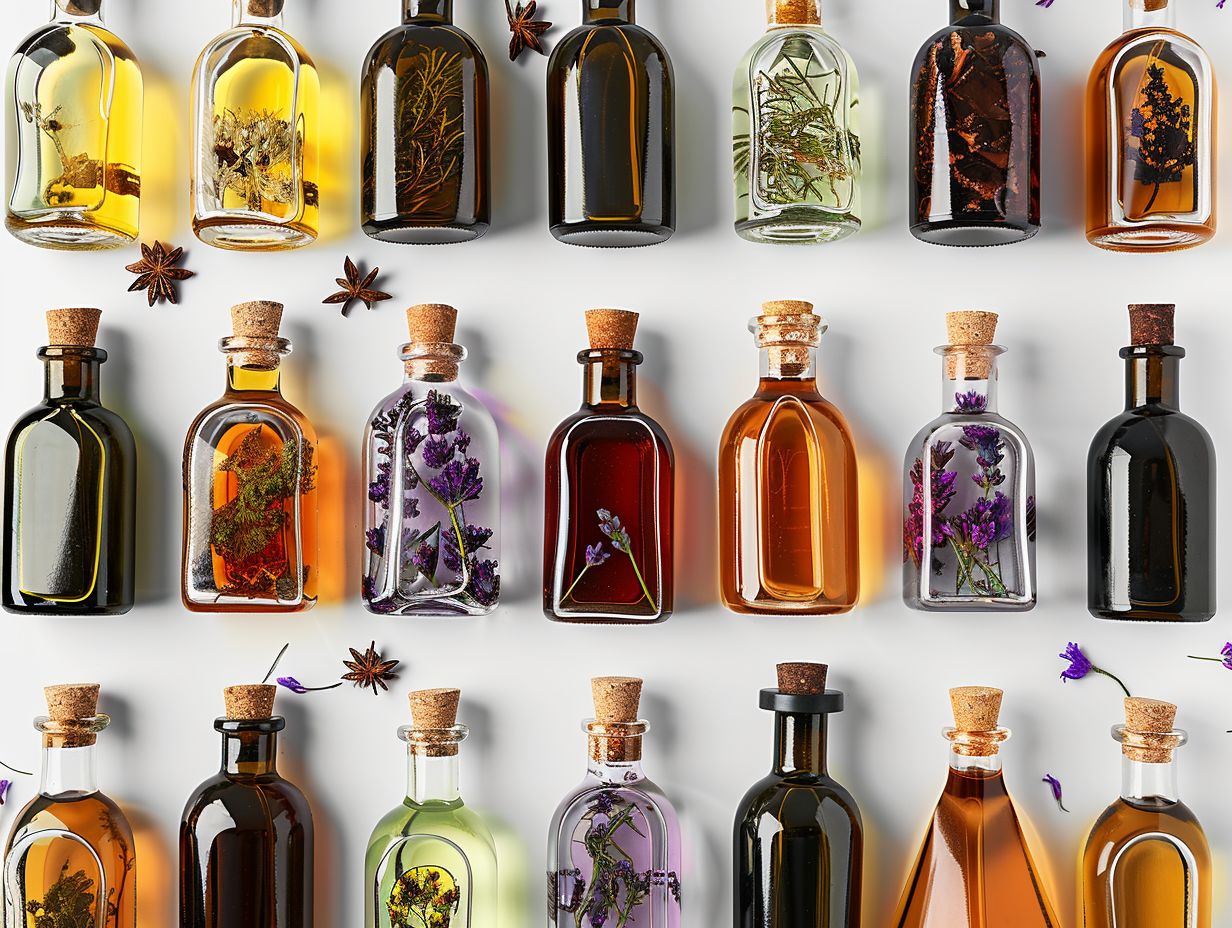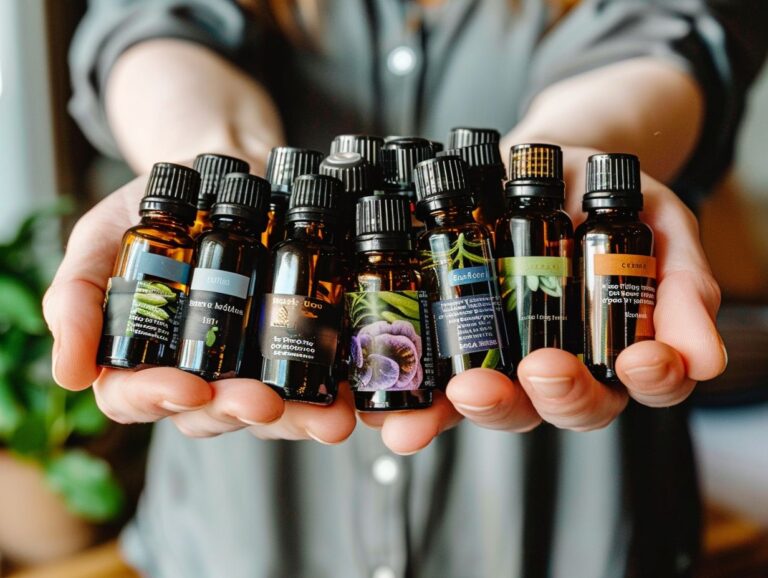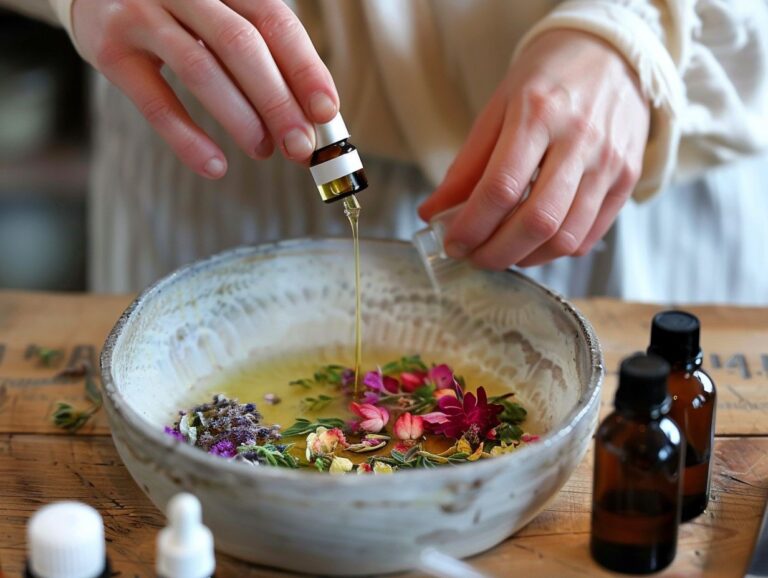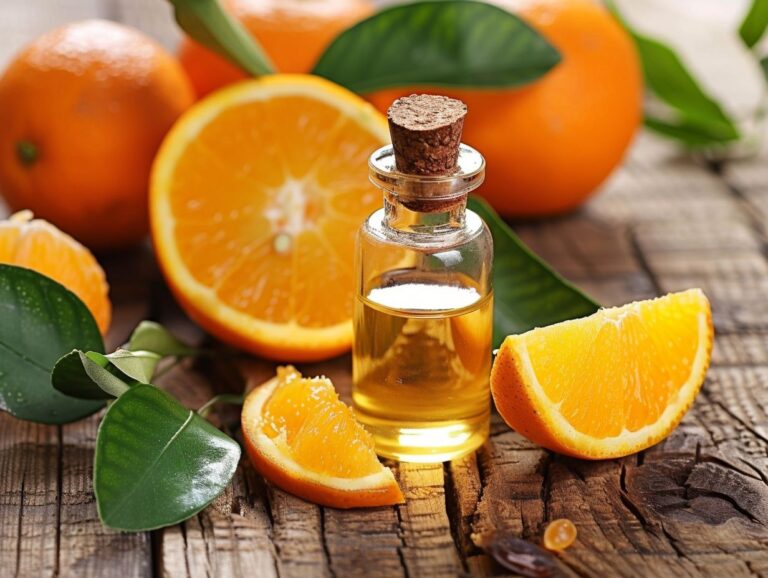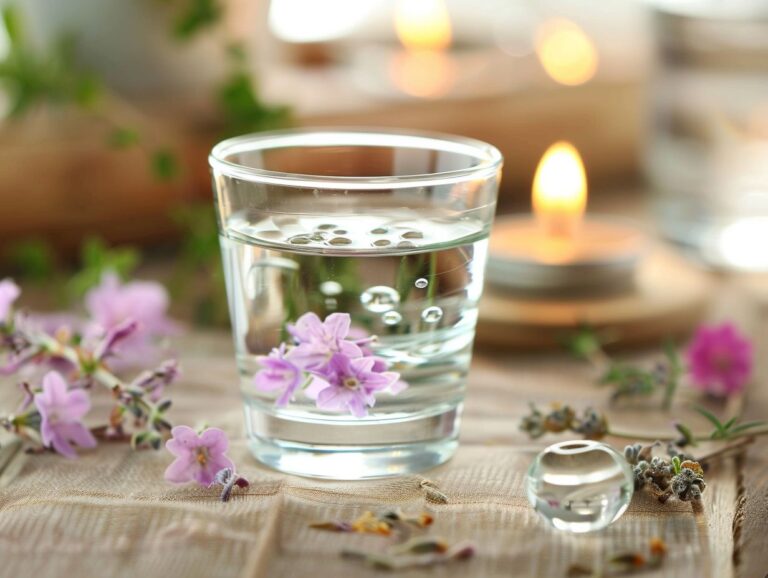Can You Take Too Many Essential Oils
Essential oils have become increasingly popular for their various benefits, including aromatherapy, skin care, pain relief, and stress relief.
It’s important to be aware of the potential risks of too many essential oils.
We explore the benefits of essential oils, the risks of overuse, recommended dosages, and how to use them safely.
We discuss the different types of essential oils, such as citrus, floral, herbaceous, and woody oils.
If you’re curious about essential oils and want to learn more, keep reading!
Key Takeaways:
What Are Essential Oils?
Essential oils are highly concentrated plant extracts that retain the natural aroma and flavor of their source. These oils are extracted through distillation or mechanical methods, capturing the essence of the plant in a potent form.
It’s fascinating how essential oils have been used for centuries in various cultures and civilizations for their therapeutic benefits. The extraction process involves carefully collecting the volatile oils from different parts of plants like flowers, leaves, bark, or roots. Regarding purity, it’s crucial to source high-quality essential oils from reputable suppliers to ensure they are free from synthetic additives or dilution. Popular essential oils like Lavender for relaxation, Peppermint for invigoration, and Tea Tree for its antibacterial properties are widely sought after for their diverse uses.
What Are The Benefits Of Essential Oils?
Essential oils offer a wide range of benefits for skin, health, and overall well-being. These natural aromatic compounds have been used for centuries in various cultures for their therapeutic properties.
Using Lavender essential oil, for example, can help promote relaxation, reduce anxiety, and improve sleep quality. Its soothing properties make it a popular choice for individuals dealing with stress and insomnia.
Peppermint oil, on the other hand, is known for its invigorating scent and ability to alleviate headaches and muscle pain. It can also aid in digestion and boost energy levels. Incorporating these oils into your daily routine can have a positive impact on your physical and mental well-being.
Aromatherapy
Aromatherapy is a practice that involves using essential oils for their aromatic and medicinal properties. Inhaling the scents of specific essential oils can promote relaxation, improve mood, and alleviate stress.
Research has shown that certain essential oils, such as Lavender, Eucalyptus, and Bergamot, can have profound effects on mental health and emotional well-being.
- Lavender oil is renowned for its calming properties, making it ideal for reducing anxiety and promoting better sleep.
- Eucalyptus oil is commonly used to clear the mind, enhance focus, and relieve mental exhaustion.
- Bergamot oil, with its refreshing citrus scent, can uplift the mood and combat feelings of sadness and fatigue.
Integrating these oils into your daily routine through aromatherapy practices like diffusing, inhalation, or massage can significantly contribute to a sense of calm and balance in your life.
Skin Care
Essential oils are commonly used in skincare products for their natural healing and nourishing properties. These oils can help with various skin conditions, promote skin hydration, and support overall skin health.
Regarding choosing the right essential oil for your skin type, it’s essential to consider the specific needs of your skin. For individuals with acne-prone skin, Tea Tree oil is a popular choice due to its anti-inflammatory and antibacterial properties that can help combat breakouts and reduce redness.
On the other hand, those looking to address signs of aging may benefit from incorporating Sandalwood oil into their skincare routine. Known for its anti-aging benefits, Sandalwood oil can help improve skin elasticity, reduce the appearance of fine lines and wrinkles, and promote a youthful complexion.
Pain Relief
Essential oils are known for their analgesic and anti-inflammatory properties, making them effective in managing various types of pain. When used topically or through inhalation, oils like Wintergreen and Clove can help ease discomfort.
Essential oils such as Eucalyptus and Sage are widely recognized for their pain-relieving properties. Eucalyptus oil has a cooling effect that can alleviate muscle aches when applied topically, while Sage oil is popular for its calming and soothing effects on headaches. These oils can be diluted with a carrier oil like coconut or almond oil and massaged gently onto the affected area for targeted relief. When dealing with joint pain, creating a homemade blend of a few drops of Eucalyptus oil combined with a carrier oil can be a natural remedy worth exploring.
Stress Relief

Essential oils play a significant role in stress relief and relaxation. Aromatherapy with oils like Lavender and Bergamot can help reduce anxiety, promote better sleep, and create a calming environment.
One popular method to enjoy the calming effects of essential oils is through the use of a diffuser. Mixing oils like Cedarwood and Ylang Ylang in a diffuser not only helps reduce stress but also uplifts the mood.
Remember to dilute essential oils with a carrier oil before applying them topically to prevent skin irritation. It’s crucial to perform a patch test before using a new oil for the first time to ensure compatibility with your skin.
Can You Take Too Many Essential Oils?
While essential oils offer numerous benefits, excessive ingestion can pose risks to your health. It’s essential to use oils in moderation and follow safety guidelines to prevent adverse reactions.
Some common symptoms of overusing essential oils internally include nausea, vomiting, and headaches. Too much ingestion can lead to liver and kidney damage as well as potentially dangerous interactions with medications.
To avoid these risks, always dilute essential oils before ingestion and consult with a qualified healthcare professional or aromatherapist for proper guidance. Safe dosages vary depending on the type of oil, so it’s crucial to research each oil’s recommended usage carefully.
What Are The Risks Of Overusing Essential Oils?
Overusing essential oils can lead to adverse reactions such as skin irritation, allergic responses, and respiratory issues. Some oils like Wintergreen and Camphor can be particularly hazardous if used in excess.
It’s crucial to remember that essential oils are highly concentrated extracts and should be used with caution. In cases of overuse, skin irritation is one of the most common reactions observed, presenting as redness, itching, or even burns. Allergic responses may manifest as rashes, hives, or swelling, particularly in sensitive individuals. To know more about whether too many drops of essential oils can be harmful, consult with an expert for guidance.
Respiratory issues can also arise from inhaling large quantities of essential oils, leading to symptoms like coughing, chest tightness, or difficulty breathing. If these signs occur, it’s essential to immediately discontinue use and seek medical advice to prevent further complications.
What Is The Recommended Dosage For Essential Oils?
Determining the correct dosage of essential oils is crucial for safe and effective use. Guidelines vary depending on the oil and intended application, so it’s essential to follow specific recommendations.
When using popular oils like Peppermint and Lavender, it is crucial to ensure accuracy in measurements. For Peppermint, a general guideline is 1-2 drops per 100ml of carrier oil for topical application. Similarly, Lavender oil typically requires 2-4 drops per 100ml of carrier oil. Always remember that these are just starting points, and individual sensitivities may vary.
Dilution is a critical step in using essential oils safely. Most essential oils should be diluted in a carrier oil before applying to the skin to prevent skin irritation or adverse reactions. Carrier oils like coconut, almond, or jojoba are commonly used for this purpose.
How To Use Essential Oils Safely?
Using essential oils safely involves proper dilution, conducting patch tests, following recommended dosages, and seeking advice from a healthcare professional when necessary. Safety is paramount when using these potent oils.
Proper dilution is crucial as undiluted essential oils can cause skin irritation or sensitization. It’s recommended to dilute with a carrier oil like jojoba or coconut oil before applying to the skin.
Conducting a patch test before widespread use helps identify any potential allergic reactions. Apply a diluted oil to a small area of skin and wait 24 hours for any adverse reactions.
Always follow recommended dosages; excessive use can lead to headaches, nausea, or skin irritation. More is not always better when it comes to essential oils.
Consulting a healthcare professional, especially for pregnant women, children, or individuals with health conditions, is essential to avoid adverse reactions or contraindications.
Be aware of potential risks such as phototoxicity, interactions with medications, or respiratory issues. Educating oneself on safety practices is key to enjoying the benefits of essential oils without any harm.
Dilute Essential Oils
Diluting essential oils with carrier oils before topical application is essential to prevent skin irritation and maximize safety. Dilution ratios vary based on the oil and intended use.
When working with potent essential oils, diluting them properly is key to avoid sensitizing the skin or causing adverse reactions. A general rule of thumb for dilution is to use 1-2% of essential oil per ounce of carrier oil. For stronger oils like cinnamon or oregano, it’s advisable to dilute even further, aiming for 0.5-1%. Popular carrier oils like Jojoba and Coconut are excellent choices due to their mild nature and compatibility with most skin types. Always perform a patch test before widespread use to ensure no allergic reactions occur.
Do A Patch Test

Performing a patch test before widespread use of essential oils helps identify potential allergic reactions or sensitivities.
This simple yet crucial step involves applying a small amount of diluted essential oil mixture onto a patch of skin, typically on the inner forearm or behind the ear.
By observing the area for at least 24 hours for any signs of redness, irritation, itching, or swelling, you can determine if the oil is safe for broader application.
Follow Recommended Dosages
Adhering to recommended dosages for essential oils is crucial to avoid adverse reactions and ensure safe usage. Different oils have varying potency levels, so precise dosing is essential.
For instance, the calming Lavender oil typically requires 2-3 drops for diffusing, while the more potent Tea Tree oil should only be used in small amounts due to its strength. It is important to always dilute essential oils when applying them topically to prevent skin irritation. Overuse of essential oils can lead to headaches, nausea, allergic reactions, or even more severe issues like respiratory distress or skin burns. Always remember that a little goes a long way with these concentrated extracts. It’s best to start with a small amount and gradually increase if necessary, seeking guidance from a qualified aromatherapist if needed.
Consult With A Professional
Seeking advice from a healthcare professional or aromatherapist can provide valuable insights on safe essential oil usage, especially for individuals with pre-existing conditions or specific health concerns.
Professional guidance is crucial when using essential oils, as they are potent substances that can have powerful effects on the body.
It’s important to consider factors such as proper dilution, application methods, and potential interactions with medications.
Vulnerable populations, such as children or pregnant women, need to exercise extra caution when considering how many essential oils can be used at once due to their sensitive systems.
Always perform a patch test before applying any new essential oil to check for any adverse reactions, and discontinue use if any irritation occurs.
Remember, everyone’s body reacts differently to essential oils, so what works for one person may not work for another.
What Are The Different Types Of Essential Oils?
Essential oils come in various types, each with unique aromas and therapeutic properties. Categories include citrus oils, floral oils, herbaceous oils, and woody oils, offering diverse benefits for different purposes.
Citrus oils like Lemon are known for their uplifting and refreshing scents, perfect for boosting energy and mood. On the other hand, floral oils such as Lavender are often used for relaxation and stress relief due to their calming properties. Herbaceous oils like Sage offer a grounding effect, ideal for balancing emotions and promoting mental clarity. Woody oils such as Sandalwood are deeply grounding and can assist in meditation and spiritual practices.
Citrus Oils
Citrus essential oils are derived from fruits like Lemon, Grapefruit, and Bergamot. These oils offer uplifting and refreshing scents, ideal for boosting mood and creating a vibrant atmosphere.
Citrus essential oils are known for their invigorating properties, making them popular choices in aromatherapy. They can help alleviate stress and anxiety due to their bright, citrusy aroma. When diffused in the air, these oils can help improve focus and increase energy levels.
Plus their mood-boosting benefits, citrus essential oils also possess antibacterial and antiviral properties, making them excellent additions to natural cleaning products. Their fresh fragrance can leave your home smelling clean and revitalized without harsh chemicals.
Floral Oils
Floral essential oils such as Lavender and Rose are prized for their calming and balancing effects. These oils are commonly used in skincare, relaxation blends, and perfumery.
They possess unique aromatic profiles that not only please the senses but also provide therapeutic benefits for both the mind and body. Lavender oil, known for its soothing properties, is often used to promote relaxation and improve sleep quality. On the other hand, Rose oil is celebrated for its skin-rejuvenating properties and its ability to uplift the spirits.
- In aromatherapy, floral essential oils are widely used to alleviate stress, anxiety, and tension. Their calming scents can help create a peaceful environment and reduce feelings of overwhelm.
- Regarding skincare, these oils can be beneficial for various skin types. Rose oil, in particular, is cherished for its hydrating and anti-aging properties, making it a popular choice in natural skincare products.
Some other popular floral essential oils commonly used in aromatherapy include Chamomile, Ylang Ylang, and Neroli. Each of these oils offers its own set of therapeutic benefits, from promoting relaxation to enhancing mood and reducing inflammation.
Herbaceous Oils

These herbaceous essential oils possess purifying properties that can help to eliminate bacteria, viruses, and allergens from your living space. Incorporating them into DIY cleaning products can enhance their effectiveness in creating a healthier environment.
The soothing aroma of these oils can also promote relaxation and reduce stress, fostering overall well-being. To harness their benefits, you can add a few drops of Sage or Thyme oil to homemade surface sprays, laundry detergents, or air fresheners.
Woody Oils
Woody essential oils such as Sandalwood and Cedarwood have grounding and calming aromas. These oils are popular for meditation, relaxation, and promoting mental clarity.
When using woody essential oils for aromatherapy, it is essential to recognize their grounding properties. These oils can help in creating a sense of stability and balance. Blending them with citrus oils like Bergamot or floral oils like Lavender can enhance their effects for relaxation and focus. Remember to dilute them properly with a carrier oil before applying to the skin to avoid any potential irritation. The warm, earthy scents of woody oils can provide a soothing environment, ideal for unwinding after a long day or preparing for a mindful meditation session.
Frequently Asked Questions
Can you take too many essential oils?
Yes, it is possible to take too many essential oils. Essential oils are highly concentrated and can be harmful if not used properly.
What happens if you take too many essential oils?
If you take too many essential oils, you may experience side effects such as skin irritation, nausea, vomiting, or headaches. In severe cases, it can lead to liver or kidney damage.
How much is too much when it comes to essential oils?
The amount of essential oils that is considered safe varies depending on the type of oil and the individual’s health and age. It is important to always follow recommended dilution guidelines and consult a healthcare professional if unsure.
Can I overdose on essential oils?
Yes, it is possible to overdose on essential oils. It is important to always follow recommended dosages and to never ingest undiluted essential oils.
Are there any risks associated with taking too many essential oils?
Yes, there are risks associated with taking too many essential oils. These include allergic reactions, skin irritation, and potential harm to internal organs.
What should I do if I think I have taken too many essential oils?
If you experience any adverse reactions or think you may have taken too many essential oils, seek medical attention immediately. It is also important to inform your healthcare provider about any essential oils you have taken.

